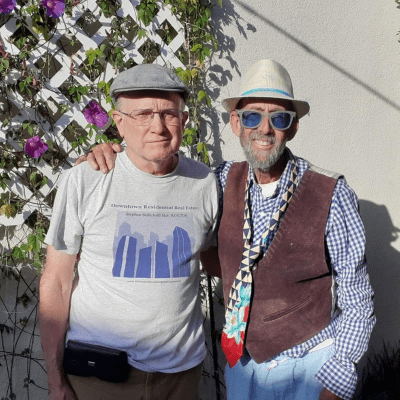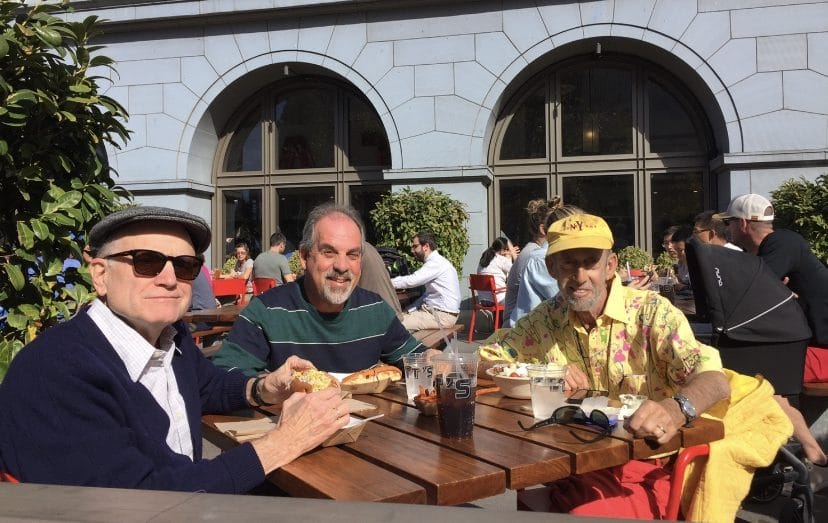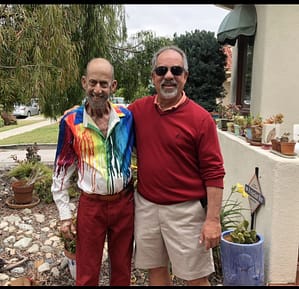
Ed Casson, Stephen’s husband, and Ken May, Stephen’s brother, shared their story in August of 2021.
Stephen Seiferheld May was a generous supporter of Compassion & Choices. He also volunteered his time to advocate for the option of medical aid in dying when legislation was being heard in 2015 and again in 2021 when SB 380, a bill to improve access to California’s End of Life Option Act, was introduced.
Aside from his commitment to the end-of-life movement, Stephen was also an assiduous activist for, and contributed to, a number of causes. Stephen was not one who would do something that was contrary to his beliefs. The overriding cause of his life was fighting for humanity and justice. He was arrested numerous times for standing up for what he believed was right, and he always knew what was right.
At age 22, Stephen discovered his activist side when he found a Gay Liberation group. Those were the days when the police were busting gay bars and arresting men essentially for their sexual orientation. This pivotal moment in his life gave him a chance to come out of the closet and live a life that was consistent with who he was. For 41 of his 74 years, his loving partner Ed Casson was by his side. When they were finally able to get married, they did so on the first day they legally could.
While living with late stage kidney disease and before Stephen realized a need for the option of medical aid in dying for himself, in March 2021 he had a letter to the editor published in the Los Angeles Times. His words of support were hauntingly prescient:
“Yes, improve and reauthorize California’s End of Life Option Act. . . .What kind of person or lawmaker would say this to a terminally ill person who is suffering a long, painful, drawn-out decline: You cannot choose to bring this miserable stage of your own life to an end on your own terms. No, you must writhe in pain for however long, while those around you watch helplessly and suffer along with you, until your body finally gives out.”
During the spring, Stephen suffered miserably – numerous visits to the ER, overnight stays at the hospital, four days of his dialysis catheter site bleeding continuously, three blood transfusions, sleepless nights and uncontrolled bouts of sobbing from unrelenting suffering. He was no longer able to walk his and Ed’s dog, German; garden; cook or do any of the important things that made life enjoyable for him. In order to continue dialysis, he was going to have to go to the hospital again for surgery, and he didn’t want to go back to the hospital.

(L to R) Photo of Ed Casson, Ken May and Stephen May
Stephen decided it was time to ask his doctors about ending dialysis treatments. His nephrologist told him that without dialysis, the toxins would overtake his body and he was unlikely to live longer than two weeks.
In a letter explaining his decision to his husband, Ed, and his brothers, Ken and Larry May, Stephen shared that he feared being in the hospital for an undetermined length of time and ultimately dying in the hospital. He wanted to die at home. He was tired of explaining to people that though he sounded good or looked good that it didn’t negate the fact that he felt horrible. He was becoming weaker and weaker, spending the vast majority of his time devoted to just staying alive, but with no joy. No quality of life. There was never any respite for him, not anymore. Stephen wanted to stop dialysis while he was still coherent, able to express himself and his wishes clearly, and say his goodbyes to loved ones. Ed and Stephen’s brothers understood.

(L to R) Photo of Stephen May and brother Ken May
On May 23rd, Stephen stopped dialysis and enrolled in home hospice care the following day. Stephen had already felt he had a poor quality of life prior to entering hospice. When he entered hospice he was relieved he didn’t have to do the things he didn’t want to do and that his suffering would soon cease.
Two weeks, however, dragged onto three weeks. Then, four weeks. In the beginning, Stephen was in great spirits. He, Ken and Ed played board games and took local road trips. Stephen got to visit the LGBTQ center that he and Ed had been significant donors of. He saw the meeting room named after them and some new construction and developments at the center.
But as the weeks unexpectedly stretched on, Stephen’s suffering became intolerable. He worried he had made a mistake placing all his trust in the timeline his doctor had provided him. Should he have asked for an aid-in-dying prescription just in case he needed an alternative plan?
On June 19th, Stephen expressed his interest in medical aid in dying to his husband and his nurse. The request, though, had to wait until Monday because a doctor was unavailable during the weekend. Two days later, on Monday, Stephen once again expressed his desire to access California’s End of Life Option Act. He was provided a form to fill out that needed to be hand-delivered or faxed so then the first official day of his request became June 23rd.
Stephen talked with two doctors and filled out the form, but on day 14 (of the required minimum of 15 days between requests) Stephen took a turn for the worse and his primary doctor concluded that he was no longer eligible to receive a prescription. Stephen died two days later on July 8th.
Instead of dying within two weeks, Stephen endured what he feared – a prolonged death. It took nearly eight weeks for him to pass.
If SB 380 had been in place, he would have been able to receive the medication in time because, among other things, it reduces the mandatory minimum 15-day waiting period between the two oral requests for aid-in-dying medication to 48 hours, and Stephen would not have had to spend his final days suffering as he did.
The cruel irony is that even though Stephen was aware of the option and had devoted countless hours and financial support to California’s medical aid-in-dying legislation, he did not ask for it early enough. If SB 380 had been in place, he would have easily been able to receive the medication in time.
Ed and Ken urge people who might want the option to get the medicine so that if they decide they want it, it is readily available to them at a time of need. “You can get the medicine; it doesn’t mean you have to take it. In Stephen’s case, it would have been good if he had asked for it early and had it at home. But we were going by what was told to us about how long he had. It never occurred to him that there would be a need.”
Update: SB 380 was signed into law by Governor Newson on October 5, 2021, and takes effect January 1, 2022.
Mail contributions directly to:
Compassion & Choices Gift Processing Center
PO Box 485
Etna, NH 03750
Compassion & Choices is a 501 C3 organization. Federal tax number: 84-1328829